Article's Content
Cybersecurity experts often talk about a holistic approach being the recipe for success. It turns out the same is true for marketing a cybersecurity brand as well.
From the outside, 1Password looks like a simple password management brand that’s taken a patient approach to achieving success. Founded in 2005, the Toronto-based company operated in the shadows for over a decade before bursting onto the scene as one of the leading privacy protection brands.
Here’s some of what 1Password has accomplished in their nearly 20 years in the cybersecurity and password management space:
- A $620-million Series C — the largest single round of any Canadian company
- Investor support from the likes of Matthew McConaughey, Scarlett Johansson, Robert Iger (Disney), and Mary Barra (GM)
- The password manager of choice for over 100,000 businesses, including IBM, Slack, and Salesforce
- Surpassed $250 million in ARR on the back of major B2B growth
But despite the financial success, there’s some stiff competition in this cybersecurity niche. Today, we’ll look at how 1Password uses partnerships, community, and content to keep up with industry leaders like LastPass and BitWarden.
State of Play in the Vital Password Management Space
As more and more of our personal and professional lives move into digital spaces, we increasingly rely on credentials for secure access: email logins, usernames, and passwords.
Unfortunately, it turns out people are particularly bad at creating, managing, and remembering this information. Especially passwords.
The Verizon 2023 Data Breach Investigations Report found that around 75% of cybersecurity breaches involve the human element — things like misused privileges, stolen credentials, and even weak passwords. From a cybersecurity lens, we’re the biggest vulnerability.
Major cybersecurity events, like the multi-organization MOAB (Mother Of All Breaches) from this past January, are becoming more frequent and making front-page news. These stories are a reminder that businesses need to take cybersecurity more seriously.
Just how serious? Well, the global market for password management solutions alone is expected to reach $3 billion by 2025, up from $2 billion in 2022.
That’s a lot of market share up for grabs.
Despite having a comparable market presence to industry-leader LastPass, 1Password sits 4th in G2s password manager rankings behind runners-up BitWarden and NordPass Business.

So, how are these competitors bringing potential users to their websites?
Looking at the traffic channel distribution between 1Password, BitWarden, and LastPass, there’s a clear emphasis on brand and content marketing. All three rely heavily on direct traffic (78%, 72%, 66%) and organic traffic (13%, 23%, 24%), with some reliance on referral and paid search as well.

Each of these password management tools has a similar product-led strategy — draw in individual users with a freemium offering and use this popularity to drive adoption at the business and enterprise level. It’s a common SaaS strategy used by brands like Calendly, Loom, and Linktree.
While the end goal — signups — is the same for each platform, there are plenty of different ways users find their way down the funnel.
The Growth Levers Driving 1Password’s Marketing Dominance
1Password’s path to success is rooted in their quality product — you can see that from how self-sufficient they’ve been from a financial perspective. For over a decade, 1Password thrived without external funding. But then, in 2019, the company raised over $200 million in a massive Series A.
CEO Jeff Shiner explained that the company had built an incredible product but needed support on the growth side, saying, “We have far less experience with things like go-to-market programs, with sales, marketing and finance teams.”
With an influx of over $900 million since that initial Series A, marketing, sales, and other departments have boosted the 1Password brand to the giant they are today. Just look at the increase in the company’s organic web presence over the past five years:
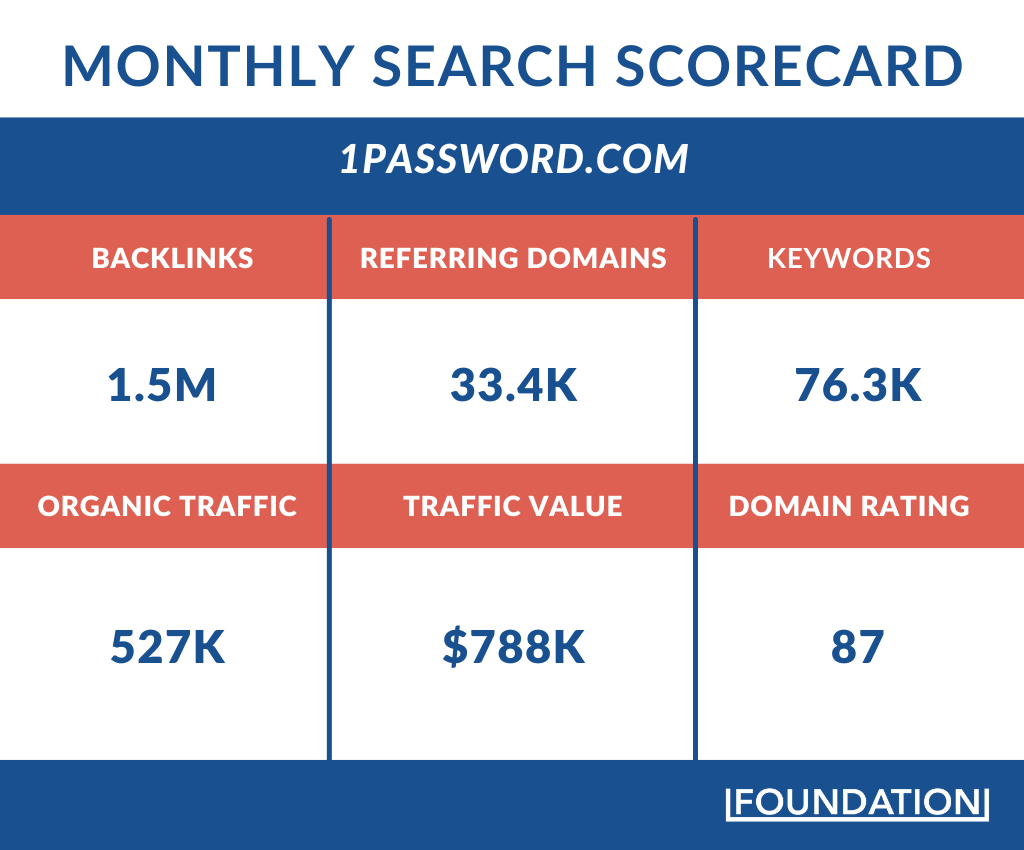
From the marketing perspective specifically, there are a few key growth hacking strategies that 1Password is using particularly well:
- A strong referral and partnership network
- Investment in community marketing
- High-conversion landing pages
Let’s take a closer look at how 1Password uses these specific growth levers to support their product-led strategy.
Building a Strong Referral Partner Network
When talking about 1Password’s Series A, Shiner made a point to emphasize the importance of growing aggressively by finding the right employees, leaders, and partners. The last point is particularly important because almost all strategic partnerships and referral networks run through backlinks.
With over 1.5 million backlinks pointing to their site, 1Password is a prime example of the marketing boost a brand gets from strategic alliances and smart placements. 1Password’s baclink network boosts their SEO rankings and, more importantly, funnels a significant amount of high-intent traffic to their site.
Take, for instance, haveibeenpwned.com (HIBP), a free creation by former Microsoft professionals that tells people if their email has been compromised in a data breach. 1Password formally partnered with HIBP in 2018, keeping them top of mind for anyone who has just found out their information is at risk.
1Password is featured prominently on the HIBP homepage, with a straightforward tagline and multiple CTAs sitting just underneath the main email search tool.

HIBP brings in over 1.2 million organic visits each month — people from around the world who are highly motivated to remedy or prevent password-related cybersecurity incidents.
Talk about a great investment.
Some of the other top referral-passing traffic and link equity to 1Password are paid sponsorships or affiliate arrangements.
WIRED’s listicle, 9 Best Password Managers 2024, brings in nearly 290,000 organic visits per month.
The piece ranks 1Password as the “Best Upgrade” option, which is the second position on the list. The top spot showcases the “Best for Most” password manager and goes to BitWarden.
At first, this seems like a loss for 1Password. But if you look at it from a growth perspective, larger businesses with bigger cybersecurity budgets are more likely to consider the “upgraded” platform. As far as affiliate arrangements go, this could be very beneficial for both WIRED and 1Password.
The New York Times’ Wirecutter takes this endorsement a step further by listing 1Password as the best overall option in their “Best Password Managers” review. We’ve previously discussed how Wirecutter built an impressive SEO moat with their high-authority review site — now that link equity is passed along to 1Password. With 83,000 monthly visits to this page alone, the Wirecutter cosign has a major impact on traffic as well.
The article also reverses the order seen in Wired’s piece, with BitWarden now coming in second place as the best budget option.
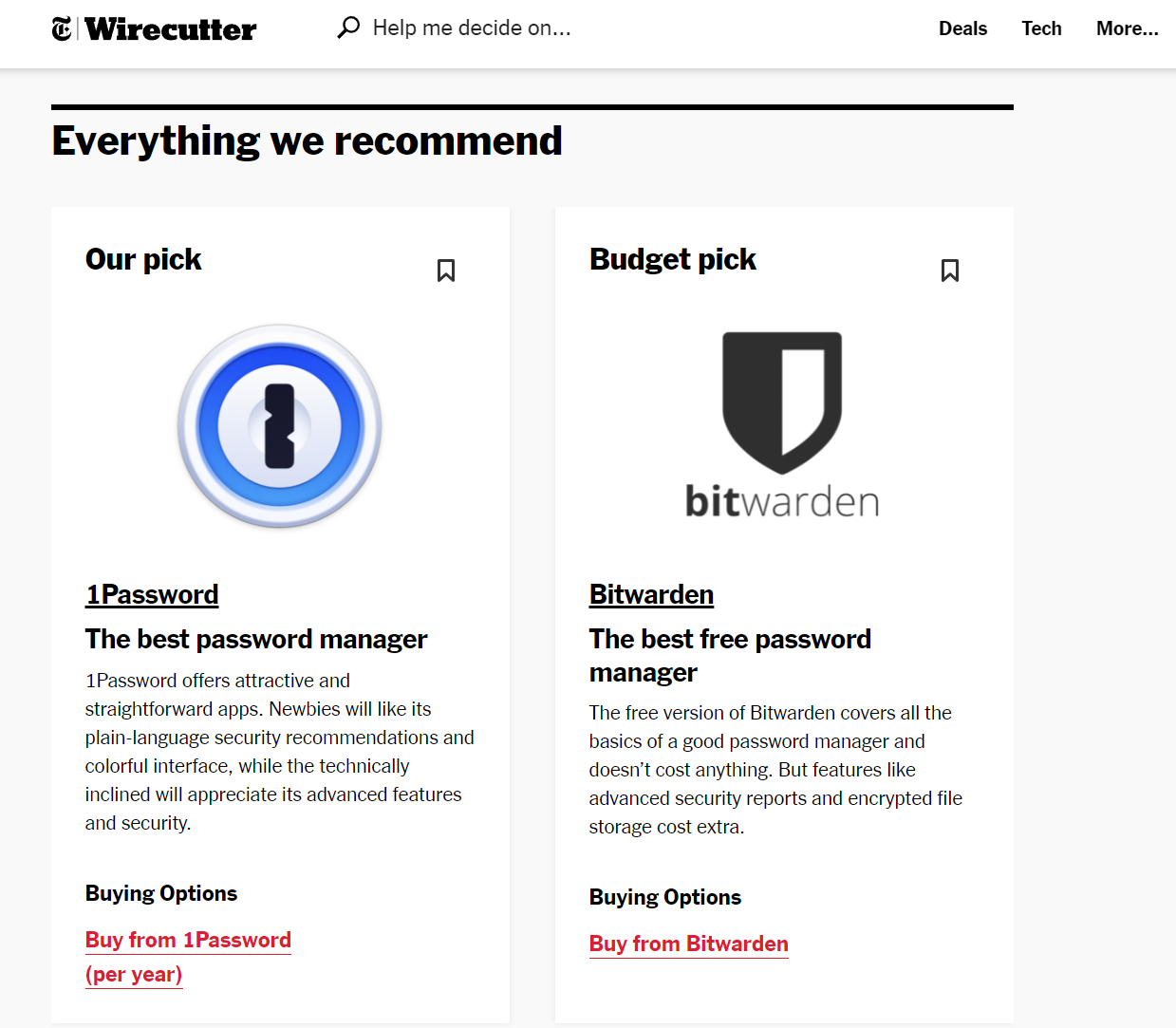
Like all Wirecutter reviews, they disclose that they “may earn a commission” when people buy through their links.
In some cases, this type of paid placement might reduce the reliability of the review. But considering these reviewers also test every product, the best overall designation for 1Password is still a big win.
Beyond individual sites, 1Password’s backlink network features a number of high-authority domains that lend credibility and drive traffic to their platform.
Reclaim.ai, which lists 1Password in their “26 best productivity apps” and other promotional pieces, contributes 5.7k backlinks. ZDNet.com’s 4.2k backlinks further underscore the diversity and authority of 1Password’s backlink portfolio.
By leveraging high-traffic sites and aligning with platforms that share their target audience, 1Password not only amplifies their reach but also positions themselves as the go-to solution for password security. It’s a key way for them to gain new business as they fight against other leading password management brands.
In fact, 1Passwords current backlink network consists of 1.5 million dofollow links, more than LastPass (840k) and BitWarden (300k) combined.
Creating Owned Community Channels
You can spend lots of money on product, marketing, and sales, but if you don’t provide your users with support and engagement, they aren’t going to stick around. And that’s bad for the bottom line.
That’s why community-based marketing is such an important tactic in SaaS — digital community engagement can significantly amplify a brand’s presence and user loyalty.
1Password is a great example of how you can create owned community channels and use them for everything from streamlined support to product and feature ideas.
Reddit: A Hub for 1Password Enthusiasts
Creating a branded Reddit profile is one thing, but running an owned subreddit is another. Businesses are typically wary of this strategy because of the unfiltered, anonymous responses that the platform is known for. It can be a scary place, brand-wise.
But if you want to win, you should go where your competitors don’t (or won’t).
That’s why the decade-old subreddit r/1Password is hosted and moderated by the company themselves. This digital haven has attracted over 29,300 members, placing it in the top 5% of subreddits by size.

The subreddit serves multiple functions.
It’s a venue for conducting in-depth customer research through AMA (Ask Me Anything) discussions.
It’s also a platform for announcing and discussing the latest company developments and feature releases.
Most important of all, it’s a channel where 1Password users can engage in unfiltered discussions with the larger community of users and company reps.
Looking at some of the top posts in r/1Password over the past month, it’s easy to see the value of an owned subreddit — when you do it right, of course.
- An appreciation post for the 1Password Reddit support staff
The top post in r/1Password over the past month is an appreciation post for the high-quality support 1Password provides — specifically, how active and responsive the representatives are in the forum. There are hundreds of upvotes and over a dozen comments echoing the sentiment.
“I’ve never seen an organization so well put-together” is some of the highest praise I’ve seen for any SaaS company. Investing resources in Reddit made that happen.
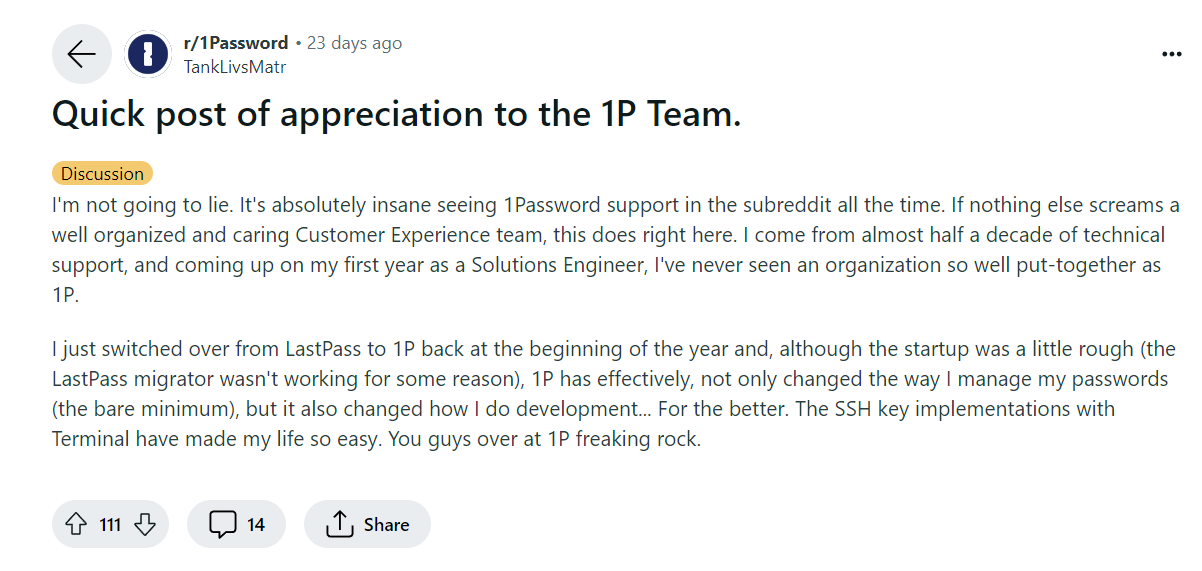
But this post is actually the end result. It’s the culmination of years of work building and maintaining an active community.
The next few posts help explain how 1Password unlocked this level of community engagement.
- A feature request about creating a standalone password generator
The second most popular post over the past month is a feature request from a new user. They’re asking for 1Password to create a standalone password generator that’s easier to access on iOS and Android — a feature that other competitors offer.
This person is on a 14-day trial and likes the platform overall and says they’re committed to a purchase, but they highlight the “amount of clicks needed to get to the generator” as a barrier.
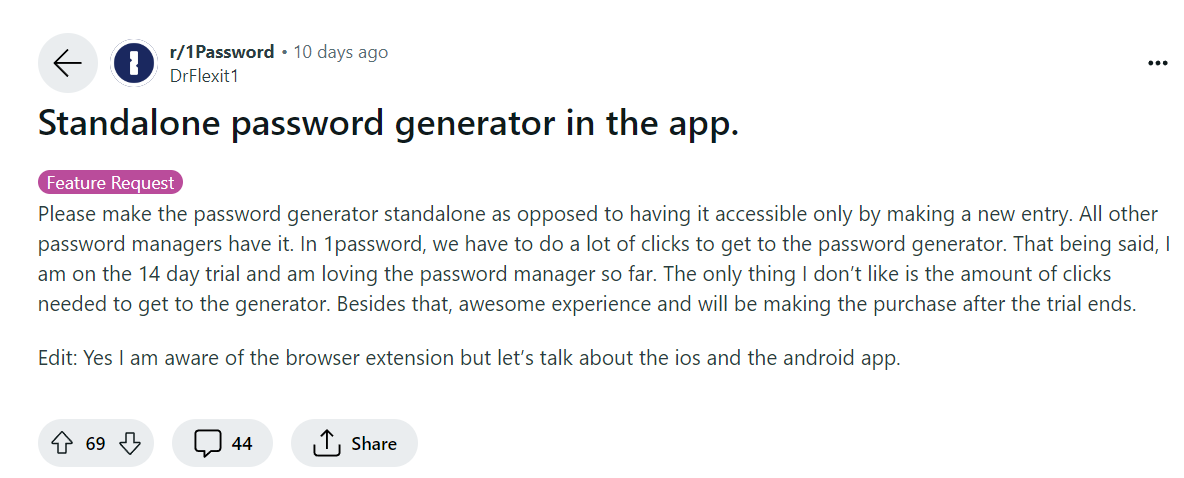
There are 40+ responses from other 1P users sharing how the new user can utilize extensions or the website for password generation. In addition, there are multiple comments from a 1Password product manager who actually helped develop earlier iterations of the product. Their initial comment includes:
- An explanation of the easiest way to generate a password (browser extension)
- The product team’s plan to make the generator more accessible
- An inquiry into the user’s current workflows to get more context on their needs
This is the type of support you’d be lucky to get via email from most vendors.
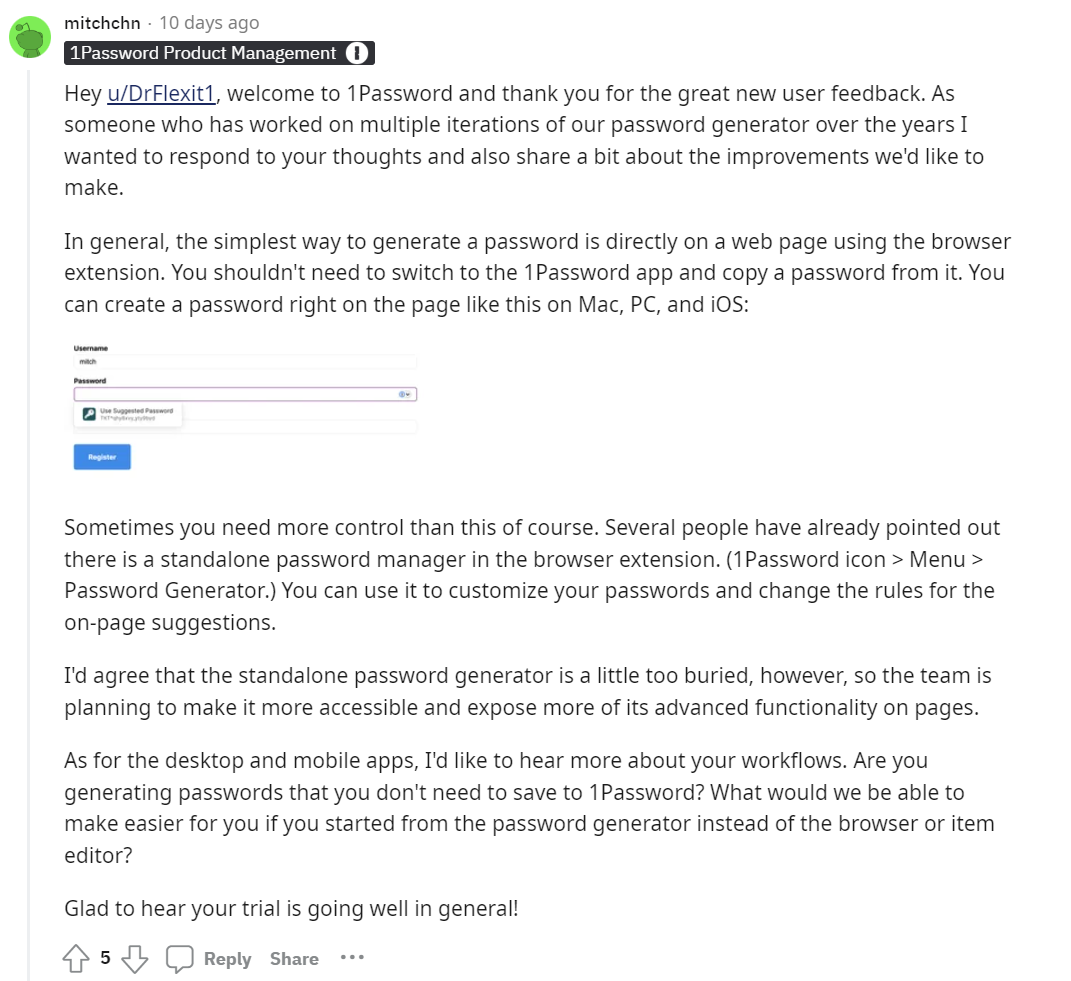
By investing in this key community channel, the 1Password team can quickly address user challenges and feature requests while gaining valuable intel for the product team.
- A release announcement about new passkey capabilities for Android apps

The third most engaging post in the subreddit over the past month comes from 1Password’s official Reddit profile. It’s an announcement that they’ve rolled out a feature for signing into Android apps.
The post contains a link to the full feature announcement on the 1Password blog, helping distribute the web content to their strong Reddit community.
This subreddit has proven to be an effective tool for distributing content, with surveys and reports often pinned at the top, engaging the community directly with the brand’s latest insights and developments.
Community Subdomain: Leveraging User-Generated Content
Complementing the Reddit community is 1Password’s community subdomain, which boasts nearly 18,000 pages of primarily user-generated content. It’s a massive library of queries from previous users that draws over 28,000 organic visits every month.

Again, this isn’t about converting new users — it’s about making sure that the existing ones feel supported by the 1Password community.
The homepage for this subdomain makes it easy for people to get involved, prominently featuring a search function and including links to blog posts, product updates, developer resources, and a knowledge base.
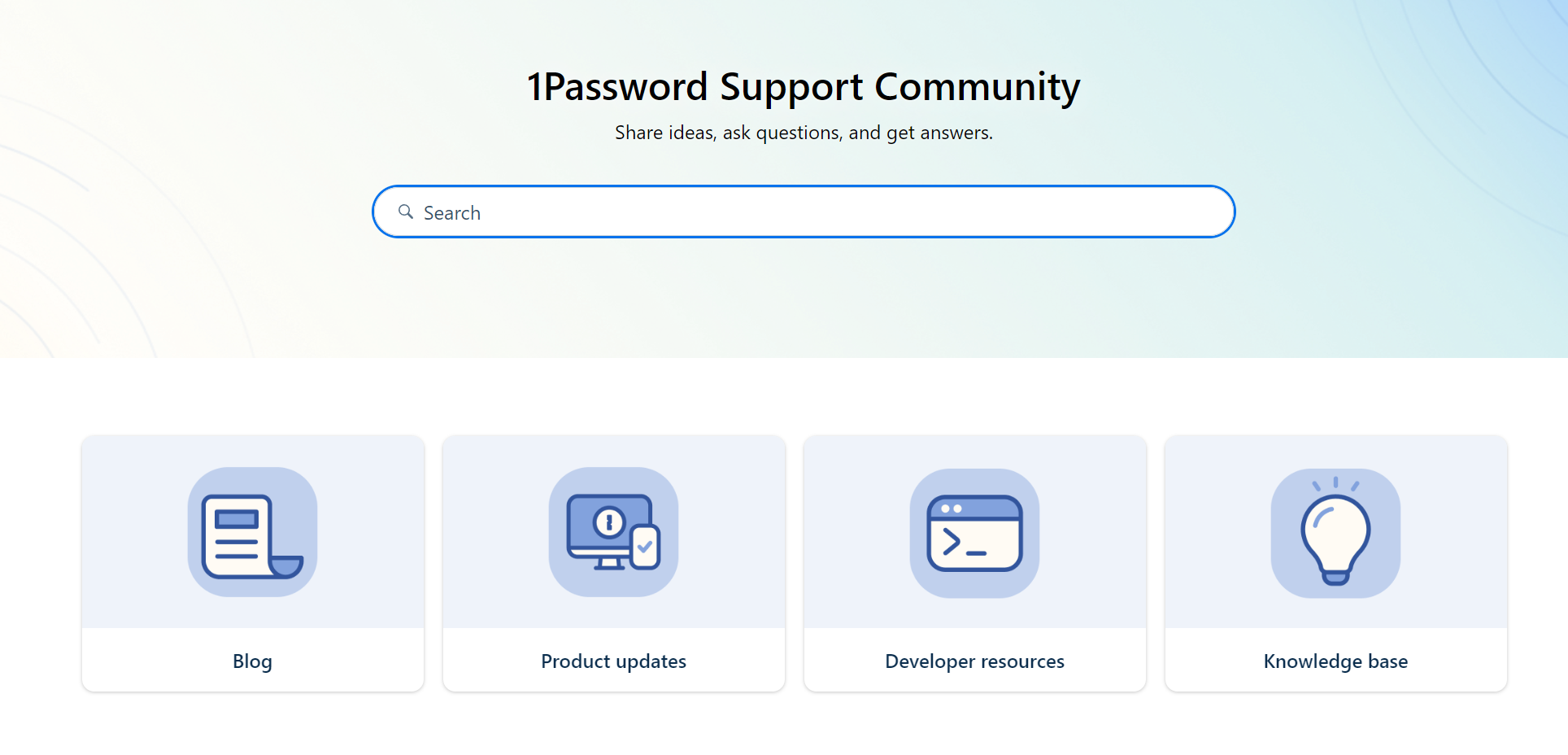

The most visited pages typically involve queries or discussions on specific challenges users face with the platform, such as Yahoo login issues or authentication with third-party sites. These discussions not only create a dynamic FAQ and answer set for common issues but also guide users toward the extensive documentation available on the main 1Password site.
Crucially, the community subdomain contributes to the website’s SEO strategy by directing over 700k dofollow “backlinks” to the main site. Despite originating from a technically distinct domain, this interlinking significantly benefits 1Password’s link equity, demonstrating a strategic blend of community engagement and SEO optimization.
Investing In Landing Page Excellence
During a time of constant Google updates and SERP volatility, 1Password has showcased a commendably consistent organic performance. From 380,000 monthly traffic across 800+ pages in March 2019, 1Password’s website escalated to 490,000 monthly traffic across 1800+ pages by March 2024.
This pace of organic growth is moderate compared to the explosive traffic spike from Carta and other SaaS companies.
However, it’s important to recognize that the measure of content marketing success isn’t pure traffic volume but the share of traffic making it to conversion-driving landing pages.
Product and Tool Pages: Providing Value at Every Turn
One standout in 1Password’s organic strategy is their free password generator tool. This landing page alone brings in 11% of the company’s total organic traffic.
This isn’t surprising, considering free SaaS tools are an immediate value add that consistently drive traffic across niches. 1Password’s password generator lets anyone create a secure password while controlling simple variables like number of characters, inclusion of numbers, and password type (random, memorable, or PIN).

To boost the value and search optimization of the page, the 1Password team includes content discussing the importance of randomness when generating strong passwords and examples of strong yet memorable passwords. This added text helps them interlink to landing pages for paid products, target commonly asked questions, and insert multiple signup CTAs.
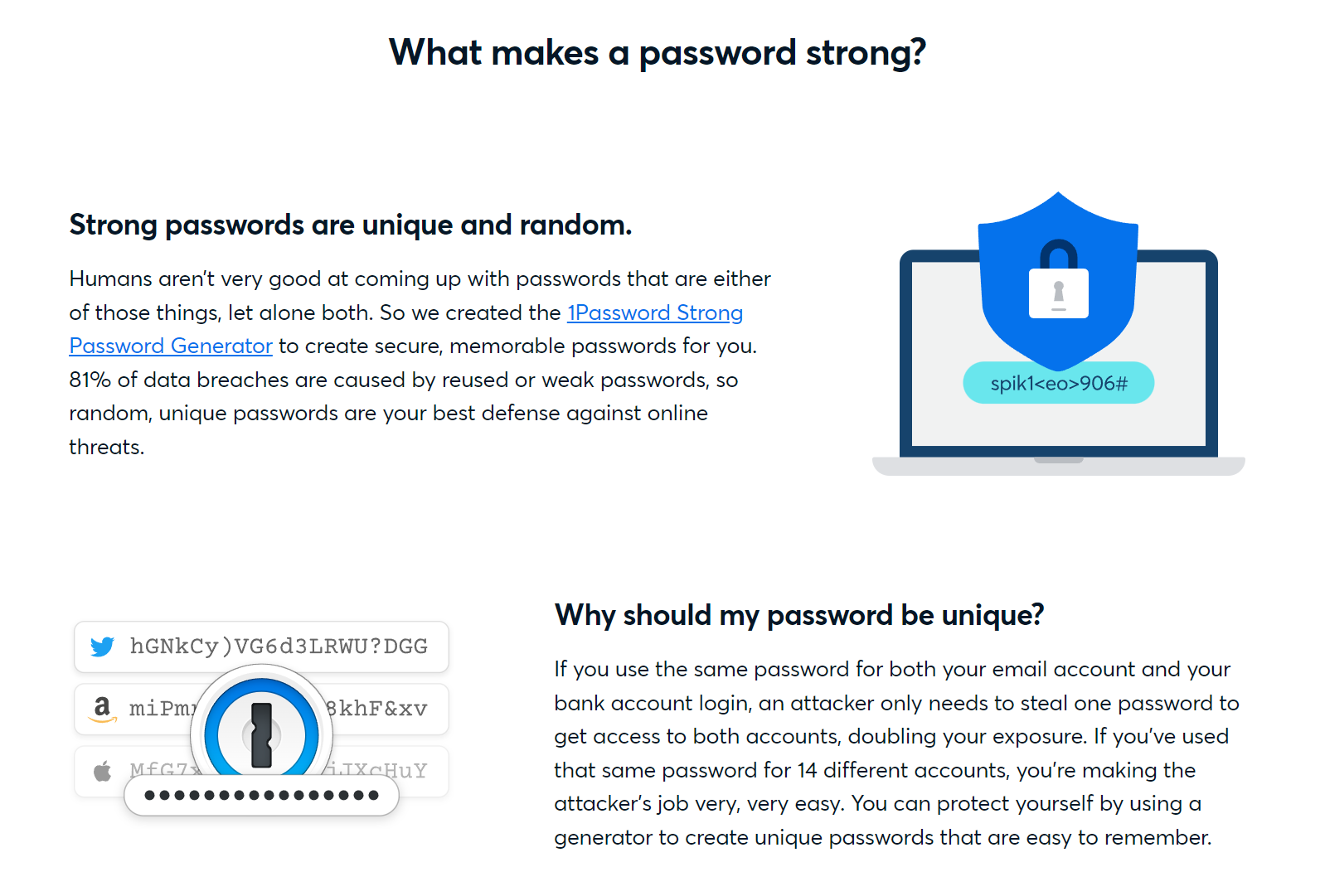
Comparison Pages: Capturing High-Intent Traffic
Understanding the competitive landscape is key to any brand’s online strategy, and 1Password excels in this regard by creating versus-style comparison pages. These pages directly address the queries of potential customers comparing 1Password with other industry leaders like Bitwarden, Dashlane, and LastPass.
By targeting users actively searching for software comparisons, 1Password captures valuable SERP real estate and high-intent traffic.
This strategic approach not only positions 1Password as a confident leader willing to stand head-to-head with competitors but also guides users closer to conversion by providing them with critical (albeit biased) comparative insights.

One way that 1Password could improve their comparison pages is actually a pretty obvious one: the table chart. As someone who looks at lots of marketing content, I can tell you that comparison tables are pretty much a staple of this asset type.
You include a table that lists the key feature sets for a product in the specific industry and then check off which ones are available with which platform.
For example, here’s a comparison page from the field management platform Jobber, showing how they stack up against two of their top competitors:

It helps high-intent page visitors quickly and easily see which software option best fits their needs.
Pricing Pages: The Gateway to Conversion
A central pillar in 1Password’s landing page excellence is their pricing page. Given that your SaaS pricing model impacts everything from revenue generation and product positioning to your retention rate, it’s important to present it to customers in the best light possible. After all, it’s the price tag that often determines whether a free trial converts into a user.
1Password has a tier-based pricing model with multiple options — individual, family, team, business, and enterprise. This variety of options (and the attractive low price) provides a clear pathway for potential customers to find a plan that best suits their needs.
The 1Password pricing page shows how much money potential users need to spend every month for different service tiers, as well as displays the key features that set each option apart.
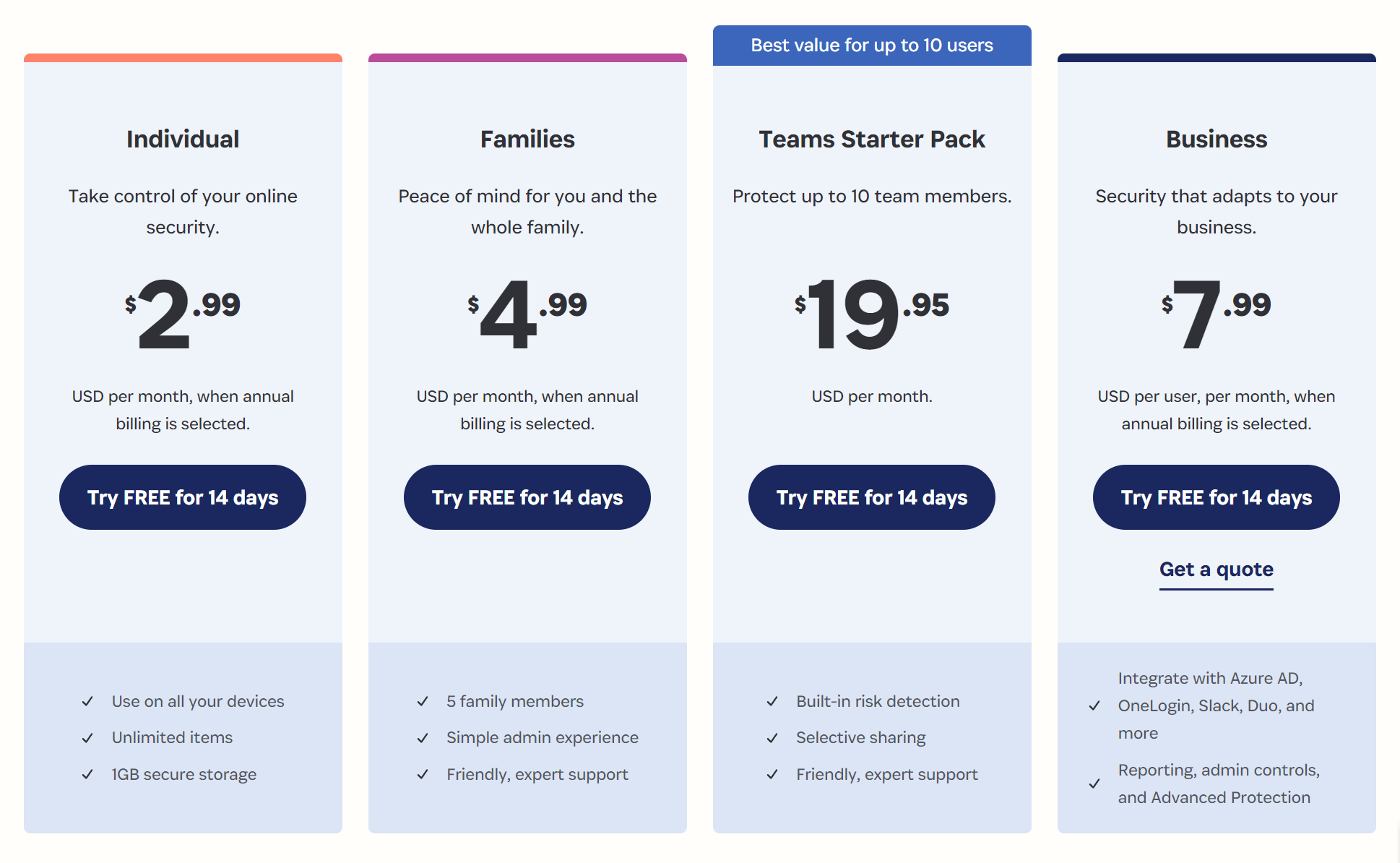
After getting the attention of visitors with a bit of pricing sleight-of-hand — presenting the low monthly cost of an annual subscription — the 1Password team includes an enterprise pricing module and then moves into a full feature comparison table.
The table compares the different 1Password membership tiers (minus enterprise) across six different feature sets and over 30 individual features. This helps answer all the initial questions potential users might have about the different options.
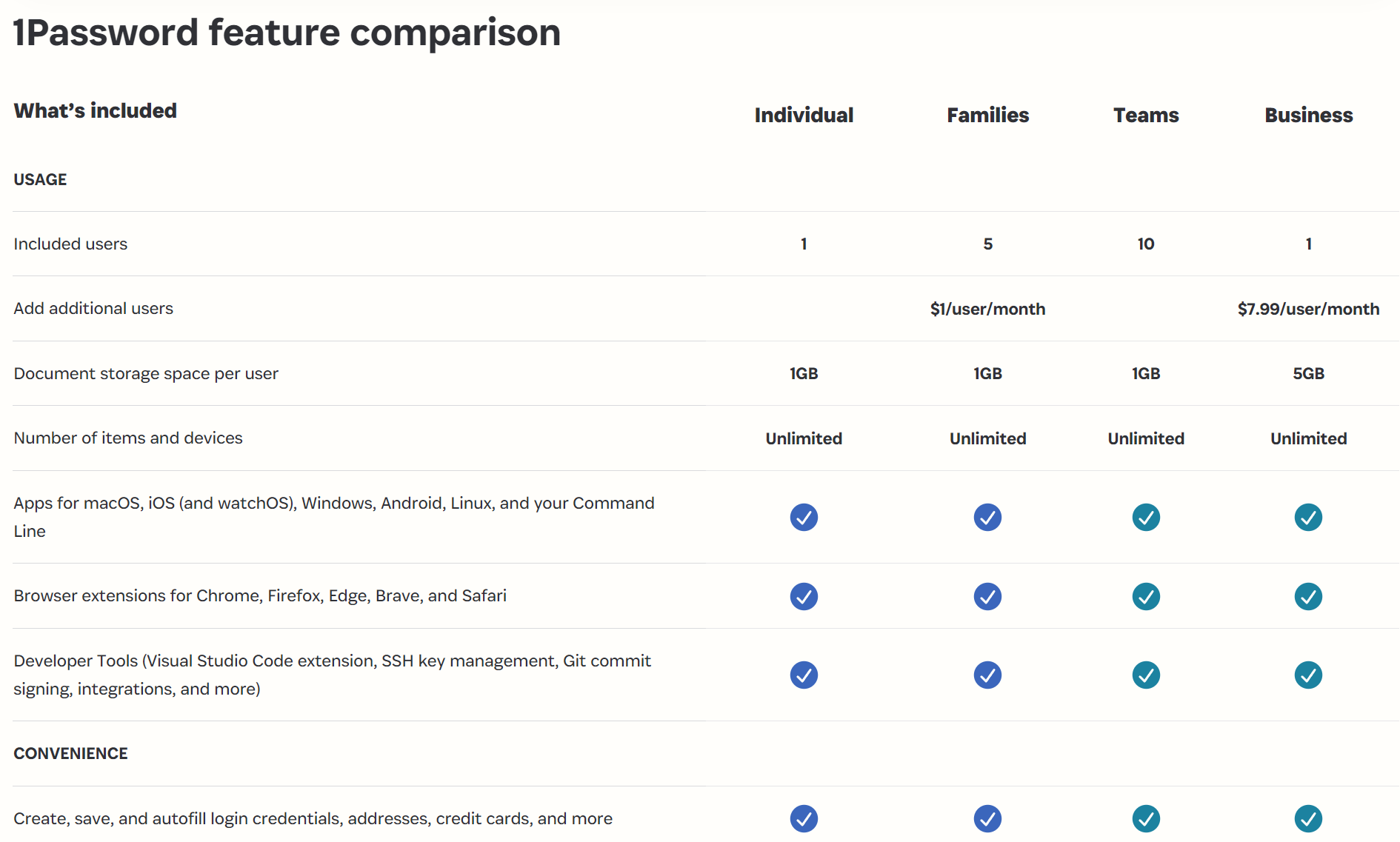
To cap it off, 1Password optimizes their pricing page for search by adding an FAQ section at the bottom. By including a module that answers questions like, “What’s the difference between 1Password Teams and 1Password Business?” or “Does 1Password have a free version?”, they expand the reach and search value of the pricing page.
Adding an FAQ section is a minor detail, but it’s one that can make a major difference in organic search results.
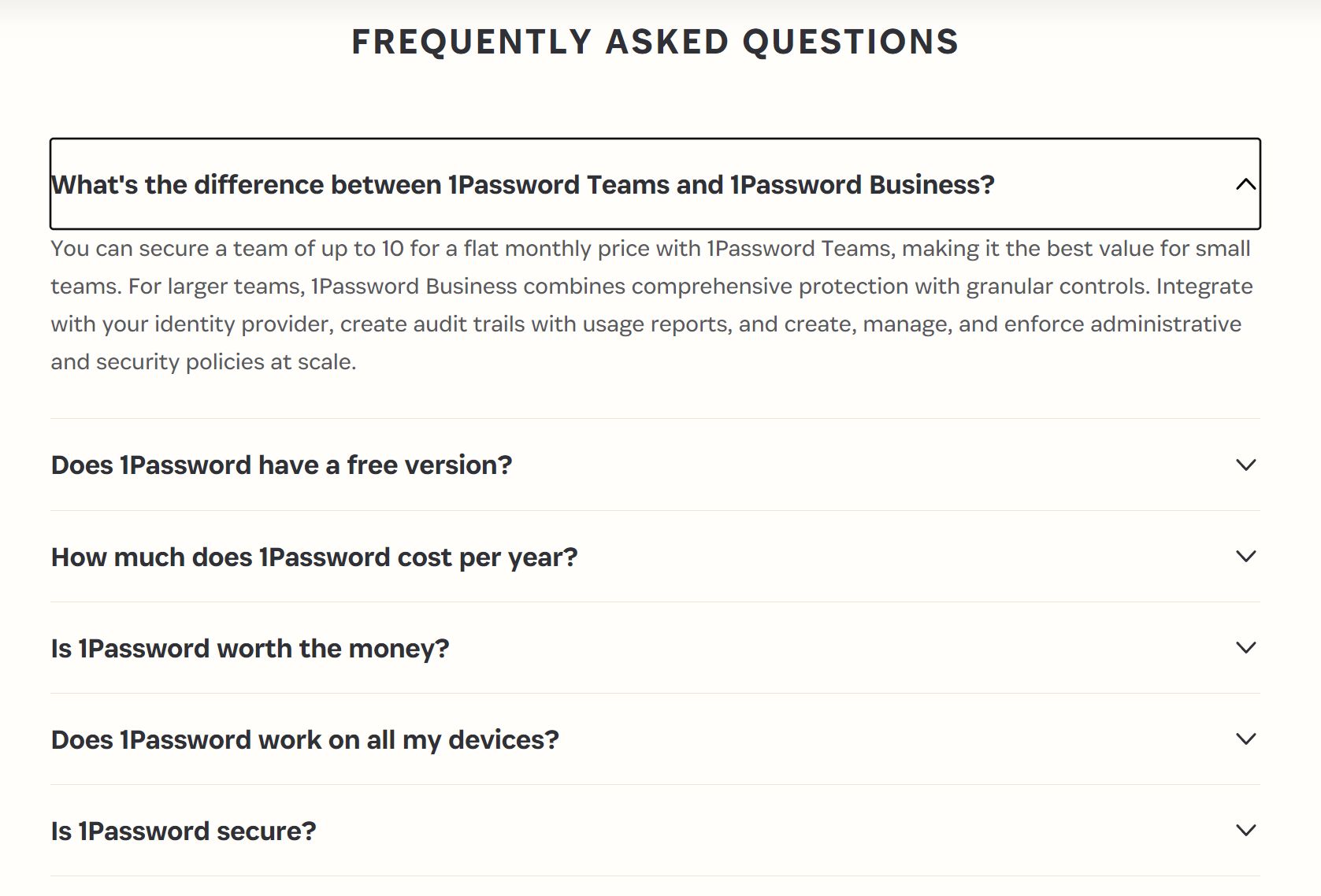
1Password’s multifaceted landing page strategy ensures that they bring in tens of thousands of mid- and bottom-of-funnel visitors every month.
These pages aren’t just digital brochures — they are dynamic tools for engagement, education, and conversion. Through meticulous optimization and strategic content placement, 1Password transforms their landing pages into powerful engines for growth.
By continually refining and expanding their landing page repertoire, 1Password not only stays ahead in the password management space but also sets a benchmark for landing page excellence in the SaaS industry.
Start Building A Winning SaaS Growth Engine Today
1Password sets a great example for any company that’s battling it out in a competitive niche. While they were able to get far on product alone, investing their funding in marketing, sales, and customer experience has been a game changer. Particularly their investment in:
- A strong network of referral partners and affiliates
- Owned community channels on Reddit and the web
- Creating high-value landing pages for high-intent search terms
For more insightful analyses on how leading SaaS brands are winning their markets, check out our collection of free breakdowns on the Foundation Lab. Discover the strategies behind the success of industry giants like Miro, Navan, and Yopto, and gather inspiration to propel your own brand forward.







